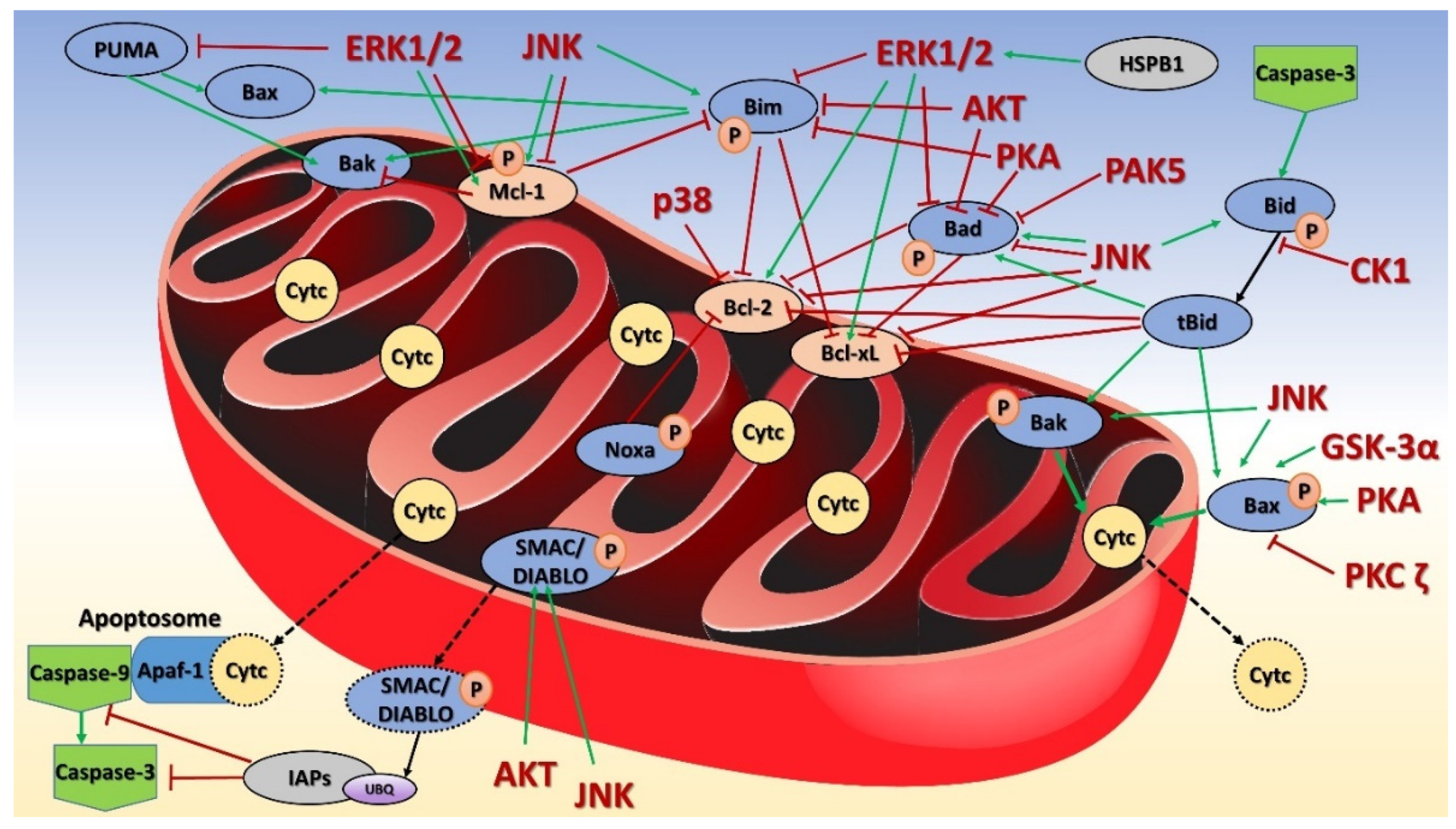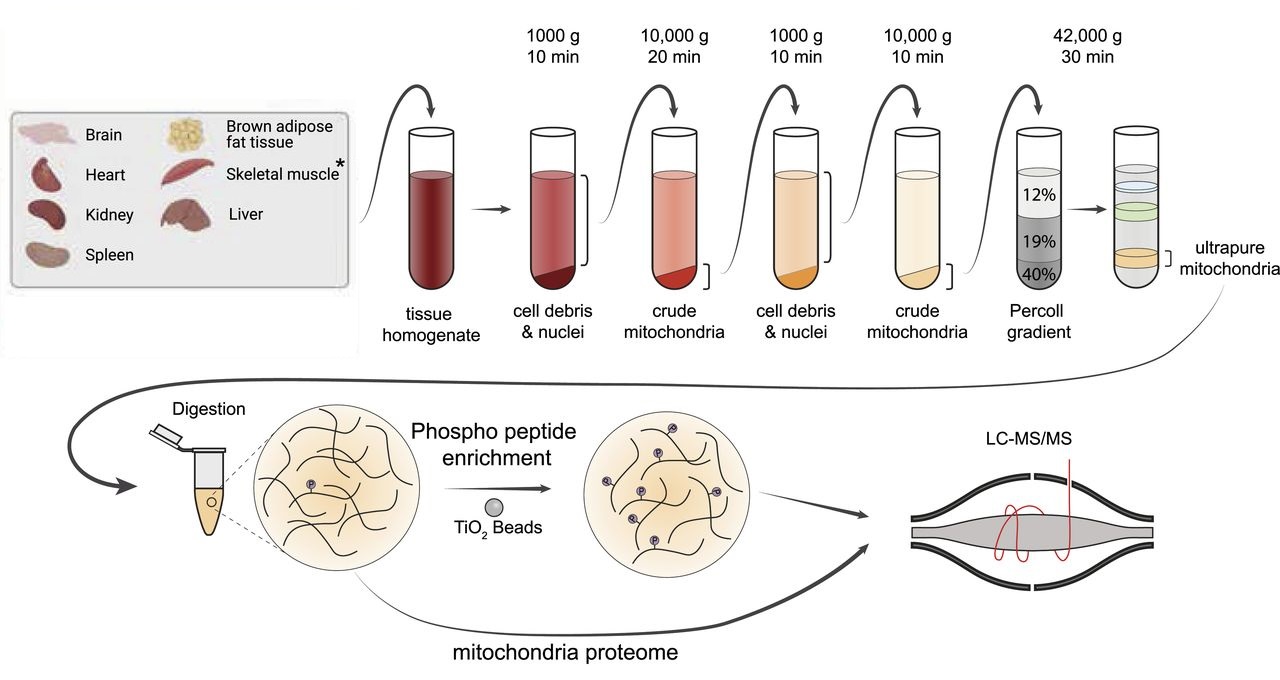Mitochondrial Protein Phosphorylation Analysis Service
- Disease Mechanism Research
- Drug Action Mechanism and Target Validation
- Energy Metabolism and Respiratory Chain Regulation
- Cellular Stress and Apoptotic Pathway Research
Mitochondrial Protein Phosphorylation Analysis Service is a systematic analysis service based on high-purity mitochondrial separation, phosphorylated peptide enrichment and high-resolution mass spectrometry detection, which aims to comprehensively identify, quantify and annotate phosphorylation modification sites on mitochondrial proteins. This service is applicable to a wide range of research areas, including basic research, high-throughput target screening, exploration of disease-related molecular mechanisms, and validation of drug action mechanisms. It is particularly well-suited for in-depth investigations into the correlation between mitochondrial dysfunction and disease.

Kotrasová V. et al. Life. 2021.
Figure 1. The apoptotic pathways influenced by mitochondrial protein phosphorylation.
Mitochondria are not only the central organelles for cellular energy metabolism but also play a vital role in regulating apoptosis, redox homeostasis, calcium dynamics, and metabolic network balance. Within the mitochondrial regulatory network, protein phosphorylation—one of the most common and reversible post-translational modifications—plays a crucial role in maintaining mitochondrial dynamics, modulating respiratory chain complex activity, and mediating stress responses. Studies have shown that the phosphorylation status of key proteins such as STAT3, DRP1, and PDH (pyruvate dehydrogenase) directly affects mitochondrial metabolic efficiency and structural function. Moreover, abnormal mitochondrial protein phosphorylation has been closely linked to the onset of various diseases. Therefore, systematic investigation of mitochondrial protein phosphorylation is essential for understanding cellular function and disease mechanisms.
Leveraging advanced chromatography and mass spectrometry platforms, MtoZ Biolabs provides Mitochondrial Protein Phosphorylation Analysis Service to comprehensively identify and quantify phosphorylation sites on mitochondrial proteins. By integrating multiple quantification strategies with in-depth bioinformatics analysis, this service reveals the regulatory mechanisms of mitochondrial function and delivers high-quality, highly interpretable data to support research in disease mechanisms, drug target discovery, and signaling pathway analysis.
Analysis Workflow
1. Mitochondrial Isolation and Quality Control
High-purity mitochondria are extracted using optimized protocols, followed by protein concentration measurement and integrity assessment.
2. Protein Extraction and Digestion
Mitochondrial proteins are lysed and digested with trypsin to generate peptide fragments.
3. Phosphopeptide Enrichment and Purification
Phosphorylated peptides are enriched and purified using techniques such as IMAC or TiO₂.
4. LC-MS/MS Analysis
Samples are analyzed using high-resolution mass spectrometry to acquire mass spectrometric data.
5. Bioinformatics Analysis
Phosphorylation sites are identified and quantified (either relatively or absolutely), and functional networks are further explored through pathway enrichment, motif analysis, and other tools.
6. Data Output and Report Delivery
Results are compiled and presented in a comprehensive analytical report.

Hansen FM. et al. Life Sci Alliance. 2023.
Figure 2. Mitochondrial proteome and phosphoproteome preparation.
Service Advantages
1. Advanced Analysis Platform: MtoZ Biolabs established an advanced Mitochondrial Protein Phosphorylation Analysis Service platform, guaranteeing reliable, fast, and highly accurate analysis service.
2. One-Time-Charge: Our pricing is transparent, no hidden fees or additional costs.
3. High-Data-Quality: Deep data coverage with strict data quality control. AI-powered bioinformatics platform integrates all Mitochondrial Protein Phosphorylation Analysis data, providing clients with a comprehensive data report.
4. High-Specificity Mitochondrial Isolation: Robust protocols for high-purity mitochondrial isolation, compatible with various cell and tissue sources.
5. Flexible Quantification Strategies: Supports multiple quantification approaches, including label-free, TMT/iTRAQ, SILAC, and PRM/MRM, to meet diverse research needs.
Sample Submission Suggestions
Sample Types: Compatible with samples such as cells, tissues, and body fluids.
Storage and Shipping: Samples should be snap-frozen in liquid nitrogen and stored at −80 °C to prevent degradation. Avoid repeated freeze-thaw cycles. Shipping on dry ice is strongly recommended.
Additional Notes: We recommend contacting us before sample submission to receive detailed and tailored sample preparation guidelines.
Applications
Application scenarios of Mitochondrial Protein Phosphorylation Analysis Service:
Uncover the role of abnormal mitochondrial phosphorylation in the pathological processes of neurodegenerative diseases, cardiovascular diseases, diabetes, and others.
Evaluate the effects of candidate drugs on the mitochondrial phosphorylation network and identify potential regulatory targets and downstream signaling pathways.
Analyze the phosphorylation of key metabolic enzymes and respiratory chain complexes to explore their role in modulating mitochondrial functional status.
Investigate dynamic changes in mitochondrial protein phosphorylation under conditions such as oxidative stress and calcium dysregulation to elucidate mechanisms of cell fate determination.
Deliverables
1. Comprehensive Experimental Details
2. Materials, Instruments, and Methods
3. Total Ion Chromatogram & Quality Control Assessment (project-dependent)
4. Data Analysis, Preprocessing, and Estimation (project-dependent)
5. Bioinformatics Analysis
6. Raw Data Files
Related Services
Mitochondrial Isolation and Mitochondrial Protein Purification Service
Mitochondrial Proteomics Services
Mitochondrial Protein Posttranslational Modification Analysis Service
How to order?







